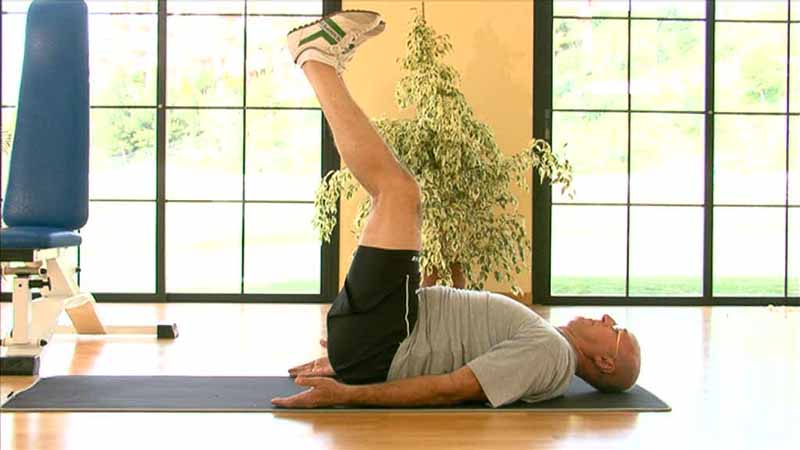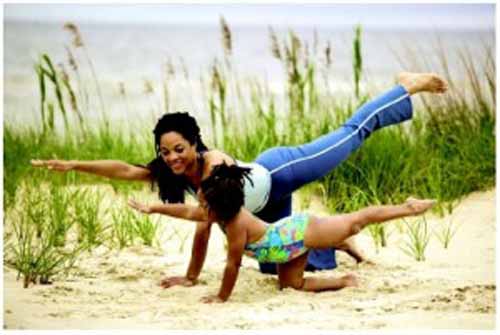

In the world of metaphysics we stress good health not only for the body, but for the mind and soul as all work in unison. Dietary needs to increase health often include organic foods - highlighted with fruits and vegetables.
There are several ways to relieve stress exercise being one of them. People who move around a lot do it to relieve anxiety and balance brain chemistry. They are sometimes thought of his ADD but not always. Walking, running, yoga, meditation and other modalities also help

Yoga balances brain chemistry and is excellent for bi-polar disorder.
Meditation relaxes the mind and allows one to move their consciousness to higher frequency, thus becoming more psychic.
Pilates and aerobics help with focus and toning.
Team and individual sports are positive forms of exercise if they do not stimulate the emotional problems people have.

Most children love exercise as they see it as play.
As we know, obesity is a global problem that includes children as well as adults. Today there are programs for all age groups that include healthy diets and exercise, each should be designed to meet the physical and emotional needs of those participating. With children, prevention is the best way to go, remembering that obesity is most often genetic and emotionally linked.

You can exercise at home alone with your ipod, DVD, or other media system - or in a gym. You can hire a personal trainer to help you develop specific areas of the body. You can also exercise just because it makes you feel good - which could include jogging and running.
People should limit exercise based on age, weight, and health problems. Don't exercise more than your body can handle, especially your knees, as a means of letting go of pent-up anger and frustration.
Helps Prevent Diseases
Our bodies were meant to move - they actually crave exercise. Regular exercise is necessary for physical fitness and good health. It reduces the risk of heart disease, cancer, high blood pressure, diabetes and other diseases. It can improve your appearance and delay the aging process.
Improves Stamina
When you exercise, your body uses energy to keep going. Aerobic exercise involves continuous and rhythmic physical motion, such as walking and bicycling. It improves your stamina by training your body to become more efficient and use less energy for the same amount of work. As your conditioning level improves, your heart rate and breathing rate return to resting levels much sooner from strenuous activity.
Strengthens and Tones
Exercising with weights and other forms of resistance training develops your muscles, bones and ligaments for increased strength and endurance. Your posture can be improved, and your muscles become more firm and toned. You not only feel better, but you look better, too!
Enhances Flexibility
Stretching exercises are also important for good posture. They keep your body limber so that you can bend, reach and twist. Improving your flexibility through exercise reduces the chance of injury and improves balance and coordination. If you have stiff, tense areas, such as the upper back or neck, performing specific stretches can help "loosen" those muscles, helping you feel more relaxed.
Controls Weight
Exercise is also a key to weight control because it burns calories. If you burn off more calories than you take in, you lose weight. It's as simple as that.
Improves Quality of Life
Once you begin to exercise regularly, you will discover many more reasons why exercise is so important to improving the quality of your life. Exercise reduces stress, lifts moods, and helps you sleep better. It can keep you looking and feeling younger throughout your entire life.

Some people can follow a regular regime while others exercise as time permits.
The benefits of any exercise program will diminish if it's disrupted too frequently. A "stop-start" routine is not only ineffective, but can cause injuries. Being consistent with exercise, therefore, is probably the most important factor in achieving desired results.
People often assume that more is better. Wrong! Doing too much too soon or performing intense exercises on a daily basis will have deleterious effects, such as muscle/tendon strains, loss of lean tissue, and fitness-level plateaus. Weight training should be done no more than three times per week targeting the same muscle groups. Exercise the same muscle groups on non-consecutive days because muscles need adequate time to recover and cannot be effectively trained if they are tired or sore.
If you are a beginner, start off slower than you think you should. Three days per week is realistic, safe and effective. If you are experienced, do cardiovascular (aerobic) exercises such as walking, jogging and bicycling for no more than 200 minutes per week with no more than 60 minutes per session.
Weight training should be done no more than three times per week targeting the same muscle groups. Exercise the same muscle groups on non-consecutive days because muscles need adequate time to recover and cannot be effectively trained if they are tired or sore.
Many people forget to stretch or make the excuse that they don't have the time. Flexibility is important, so make the time! Stretching can be done every day, but stick to a minimum of three times per week in order to reap the benefits. When the body is warmed up, such as after a workout session, perform five to 10 stretches that target the major muscle groups. Hold each stretch for 10-30 seconds.